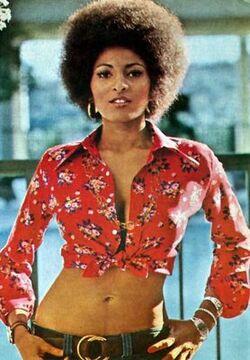David Brubeck
David Brubeck was a white person who inadvertently played jazz. Whether or not he was "the first" white man to play jazz is a point of contention, as many jazz historians also consider Kenny G, the first white man to play jazz on purpose, for that distinction. Brubeck's life story has been adapted into several "fish out of water" movies directed by John Landis.
Early Life
Brubeck was born a white man to a white family, consisting of a white father, a white mother, and two white siblings. They sent him to a white college, where he would learn with his white classmates the magic of white science and white history. Along the way, however, he took a wrong turn at Albuquerque and ended up in the black, black, very black jazz scene. With nary a white policeman around to guide him back to civilization, Brubeck, being exceptionally laid back, donned a beret and decided "I could go with this."
Jazz Career
Brubeck composed and performed several albums worth of jazz music for the white executives at Columbia, who jumped at the opportunity to make a white man successful in a black genre. His primary instrument was the piano, and both African Americans[1] and Caucasians[2] rounded out his supporting band during his fifty year career[3].
His style has been called "cool" by the jazz press, in the same way that a man wearing an eye patch is "cool."[4] He is known for frequently using strange time signatures in his compositions, a happy accident born out of his complete lack of rhythm. His 1959 album Time Out is one of the greatest selling jazz albums of all time, making it the go-to album for upper-crust individuals who want to impress their house guests with their "eclecticism."[5]
Rivalry
Brubeck's fame and fortune were threatened in the '60s when jazzonomists discovered His Whiteness was, perhaps, not His Whiteness after all. A thorough historical and anatomical study suggested that four men—Benny Goodman, Buddy Rich, Gene Krupa, and Mel Tormé—were Caucasian jazzists before Brubeck even picked up his first piano. Determined to secure his position in the history books as the Mordecai "Three Finger" Brown of jazz, Brubeck engaged in a violent vendetta against these newfound rivals, Scott Pilgrim style.
He defeated Benny Goodman quickly and elegantly, proving without a shadow of a doubt that the clarinetist was, in fact, not white but Jewish, a rare type of light-skinned negro. Krupa and Rich were, at first, tougher to conquer, but Brubeck turned the two against each other with a well-placed "My sister said she would just love to sleep with you, Krupa. I mean, Rich. Which one of you is the better drummer, again?" The ensuing brawl forced both musicians to resign from jazz for the rest of their lives. The battle against Mel Tormé raged at a stalemate for nearly 30 years, until Tormé threw in the towel in 1999 by conveniently dying.
Brubeck's rank as the original White Queen of Jazz has since gone unchallenged.[6]
Personal Life
Brubeck never married, but spent two weeks dating Pam Grier in 1978 after they encountered each other backstage at a Led Zeppelin concert in Las Vegas. A fiery romance ensued, during which an entire volume of the Kama Sutra was read, mastered, and burned to a crisp as kindling for the biggest joint you've ever seen. Brubeck later bragged "She sucked my cock dry onstage at Caesar's Palace. Veni, vidi, vici, motherfuckers." Around and around they spun within the City of Lights, churning their bodies against another in a seemingly endless quasar of pure ecstasy.
But they were spinning too fast. They had to call off the affair when Brubeck's condom broke one night, forcing Grier to contemplate the serious implications their relationship could have in the future. Neither willing to commit, both afraid of risking unwanted pregnancies and sullying Grier's perfect, ebony body. After a final, soul-entangling kiss in front of the radiant moonlight, they parted ways, Grier's magnificent afro flowing in the breeze as her '71 Mustang gained speed against the horizon. Brubeck clutched his only keepsake, the pale blue ribbon she used to tie his left hand to the bedpost on the night they met. A single tear rolled down his cheek as he clutched harder and harder on their memories. Obsidian, Onyx, Pure Black Rock. She disappeared, replaced only by the silent desert breeze. They would never to see each other again.
Brubeck resumed his life as a plain white man, but he still keeps a picture of Mrs. Grier on his mantle.[7]
Death
David Brubeck, like many other white people, is dead.
References
- ↑ Who were too polite to ask him if he was lost, and perhaps looking for a nearby Gap outlet.
- ↑ Who were probably just as confused as he.
- ↑ People can be polite for a very, very long time.
- ↑ You only want to fuck him just to say that you've fucked him.
- ↑ Not counting the similar individuals who do the same thing, but own Kind of Blue instead because they aren't racists.
- ↑ Kenny G has been too distracted by himself in the mirror to actively challenge Brubeck.
- ↑ Right next to his North Face jacket and box set of The Wire.
| Featured version: 24 January 2013 | |
| This article has been featured on the main page. — You can vote for or nominate your favourite articles at Uncyclopedia:VFH. | |


